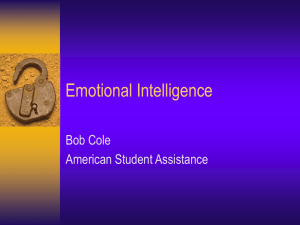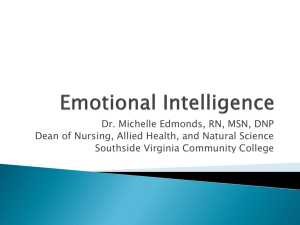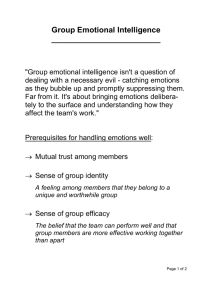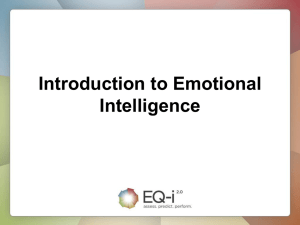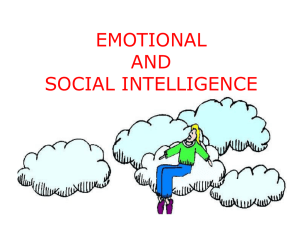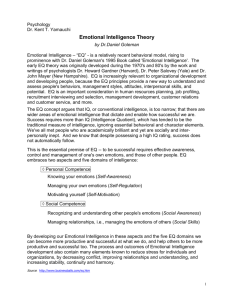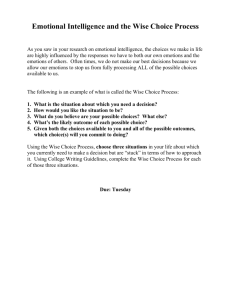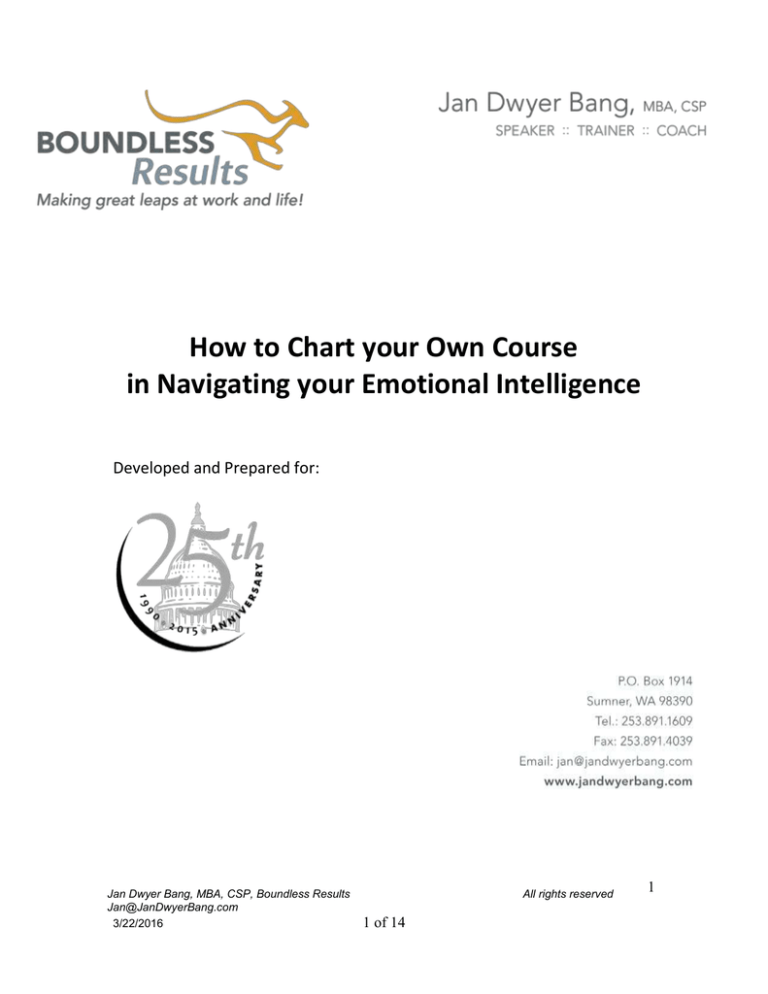
How to Chart your Own Course
in Navigating your Emotional Intelligence
Developed and Prepared for:
Jan Dwyer Bang, MBA, CSP, Boundless Results
Jan@JanDwyerBang.com
3/22/2016
All rights reserved
1 of 14
1
Jan Dwyer Bang, MBA, CSP
For refreshing new insights, radiating energy, contagious humor, and easy to
implement strategies, Jan Dwyer Bang provides a unique and memorable
experience that will leave a lasting impression for your next meeting, retreat,
or teambuilding session. Jan helps organizations, associations, and
individuals by providing customized strategies with an uncanny ability to
engage an audience.
With a University of Chicago MBA, and with hands-on experience in small
business, non-profits, and Fortune 500 companies, Jan brings expertise that
is grounded in real-world situations. She is a frequent speaker at numerous
associations and conferences and church functions.
Her topics include:
Communication Skills
Customer Service
Speaking and facilitation skills training
Teambuilding Skills
Career Development
Her training and teambuilding sessions incorporate a wide variety of popular assessment
instruments, including The Birkman and DiSC profiles. She is a published author in a number of
publications and is a featured author in the book, Real World Career Development Strategies
That Work, as well as in the book, Christian Soup for the Christian Soul II. She has been an
active member of the National Speakers Association for over twenty years and is the past
president of the Northwest Chapter of the National Speakers Association. Jan is one of less than
400 women worldwide who has earned the CSP designation (Certified Speaking Professional) for
platform excellence and client satisfaction from the Global Speakers Federation.
Clients:
The Boeing Company
Medtronic Physio-Control
Weyerhaeuser Company
Getty Images
Seattle’s Union Gospel Mission
The Starbucks Company
Los Angeles County Internal Services Department
Preferred Provider, Training and Consulting Services, State of Washington
Jan Dwyer Bang, MBA, CSP
Boundless Results
Making great leaps at work and in life
P.O. Box 1914
Sumner, WA 98390
Tel: 253-891-1609
Fax: 253-891-4039
Email: Jan@JanDwyerBang.com
Web Site: www.JanDwyerBang.com
Blog Site: www.BoundlessResults.com
Jan Dwyer Bang, MBA, CSP, Boundless Results
Jan@JanDwyerBang.com
3/22/2016
All rights reserved
2 of 14
2
After attending this session, you will learn how to:
o Practice emotional control by managing your emotions in tense situations
o Create a positive work environment for your team members and colleagues
o Be able to “tune’ into your emotions and the emotions of others
o Increase your leadership capacity by integrating your “head” with your “heart”
Activity
Think of a person in your life who you admire as a leader. What qualities does that
person possess?
What do you think really made this person successful?
“We are being judged by a new yardstick: not just how smart we are, or by our training
and expertise, but also by how well we handle ourselves and each other.”
-Daniel Goleman, Working with Emotional Intelligence
Emotions
Adapted from Josh Hammond, President of the American Quality Foundation (From Executive EQ, by
Robert K. Cooper, P.H.D, and Ayman Sawaf)
Conventional
High Performance
Sign of ___________________
Sign of ___________________
No place in _________________
Essential in business
Table ___________
_________________ them
Interfere with good judgment
Essential to good _________________
Distract us
_________________us
Sign of vulnerability
Make us real and _________
Inhibit the flow of objective
Provide vital information and
____________
Jan Dwyer Bang, MBA, CSP, Boundless Results
Jan@JanDwyerBang.com
3/22/2016
________________
All rights reserved
3 of 14
3
Without the guidance of emotions, reasoning has neither principles nor
power.”
(Robert C. Solomon, Professor of Philosophy, University of Texas)
“Reasoning/decision-making and emotion/feeling intersect in the
brain…Feelings and emotions have a truly privileged status and (exert) a
powerful influence on reasoning.”
(Antonio R. Damasio, M.D., Ph.D., Department of Neurology, University of Iowa College
of Medicine, in his book, Descartes’ Error (Grosset/Putnam, 1994)
Emotional Intelligence - (EQ)
Emotional Intelligence is essentially your “emotional flexibility” and
“expressiveness.”
EQ relates to your ability to motivate yourself and others, manage your
moods, connect with others, think clearly despite strong emotions, and
be hopeful. (Daniel Goleman)
Emotional Intelligence is the ability to sense, understand, and
effectively apply the power and acumen of emotions as a source of
human energy, information, connection, and influence. (Daniel
Goleman)
“Being able to monitor and regulate one’s own and others’ feelings, and to
use feelings to guide thought and action”.
-Peter Salovey, psychologist, Yale and John Mayer, psychologist at the University of New
Hampshire
Jan Dwyer Bang, MBA, CSP, Boundless Results
Jan@JanDwyerBang.com
3/22/2016
All rights reserved
4 of 14
4
Emotional Intelligence is not....
About being nice
About letting all our “feelings hang out”
Only a “woman’s thing”
Something we’re born with
Can Emotional Intelligence be developed?
“Absolutely. It’s all learnable,” says Daniel
Goleman, Author of Working with Emotional
Intelligence. “Unlike IQ, which some argue doesn’t
change throughout life – emotional intelligence
can be developed. It’s a neurological fact that …
brain structures and circuits shape themselves through
repeated experience. You can discipline yourself and get
better at things you once though you weren’t good at. In
fact, emotional intelligence tends to increase through each
decade of life. It’s what we used to call maturity – how we
handle ourselves and other people. You get better at it as you age.”
21 days of repeatedly doing something makes a habit!
Jan Dwyer Bang, MBA, CSP, Boundless Results
Jan@JanDwyerBang.com
3/22/2016
All rights reserved
5 of 14
5
Primal Leadership
Adapted from Daniel Goleman, Richard Boyatzis, and Annie McKee, Primal Leadership
In any human group, the leader has the most power to sway a group’s
emotions. When leaders drive emotions positively, they can bring out the
best in people. (Resonance).
When leaders drive emotions negatively, they can alter the “mood” of the
team negatively. (Dissonance).
Emotional Intelligence and Leadership
Adapted from Primal Leadership, Daniel Goleman, Richard Boyatzis, and Annie McKee
Self-Awareness - Understanding your emotions and being clear about
your purpose; being realistic about yourself; being guided by a strong
set of values.
Self-Management - The ability to manage your own emotions; being
upbeat and positive despite intense pressure; the ability to be
transparent to others.
Social Awareness –Ability to empathize with others; being “tuned” in to
the emotions and moods of others; the ability to spread positive
emotions.
Relationship Management – The ability to persuade others; deal with
conflict, collaborate with others; “resonating friendliness with a
purpose”; the ability to find common ground with others.
Leaders who maximize the benefits of primal leadership drive
the emotions of those they lead in the right direction!
Jan Dwyer Bang, MBA, CSP, Boundless Results
Jan@JanDwyerBang.com
3/22/2016
All rights reserved
6 of 14
6
Laughter and the Open Loop
From Primal Leadership by Daniel Goleman, Richard Boyatziz and Annie McKee, 2004
A study at the Yale University School of Management found that among
working groups, cheerfulness and warmth spread most easily, while
irritability is less contagious and depression spreads hardly at all. …Moods,
the Yale study found, influence how effectively people work; upbeat moods
boost cooperation, fairness and business performance.
Laugher, in particular, demonstrates the power of the open loop in
operation –and therefore the contagious nature of all emotion. Hearing
laughter, we automatically smile or laugh too, creating a spontaneous
chain reaction that sweeps through a group. Glee spreads so rapidly
because our brain includes open-loop circuits, designed specifically for detecting smiles
and laughter that make us laugh in response. The result is a positive emotional hijack.
Similarly, of all emotional signals, smiles are the most contagious; they have an almost
irresistible power to make others smile in return. …People who relish each other’s
company laugh easily and often; those who distrust or dislike each other, or who are
otherwise at odds, laugh little, if at all.
In any work setting, therefore, the sound of laughter signals the group’s emotional
temperature, offering one sure sign that people’s hearts as well as their minds are
engaged. Moreover, laughter at work has little to do with someone telling a canned
joke. In a story of 1,200 episodes of laughter during social interactions, the laugh almost
always came as a friendly response to some ordinary remark like “nice meeting you,”
not to a punch line. A good laugh sends a reassuring message: We’re on the same
wavelength, we get along. It signals trust, comfort, and a shared sense of the world; as a
rhythm in a conversation, laughing signals that all is well for the moment.“
o What do you think is your team's "emotional temperature?"
o What are some ways you can increase the "mood" of your team?
Jan Dwyer Bang, MBA, CSP, Boundless Results
Jan@JanDwyerBang.com
3/22/2016
All rights reserved
7 of 14
7
Resilient people seem to have
a capacity of hope and perseverance!
All of us have experienced setbacks or disappointments but some seem to have
the ability to “bounce back” better than others. They have developed some
reservoirs of energy and resourcefulness to draw upon. They are able to rest and
renew themselves and they are aware that flexibility, emotional adaptability,
hope, and perseverance are keys to staying effective.
So how can we increase our capacity to unexpected changes and setbacks and
live life more resiliently?
Apply one of these Resilient Strategies in your life:
Think about a past experience when you were resilient. Could you apply
attitudes, skills, behaviors that you used in the past to your current situation?
Overcome rigid thinking. Do you find yourselves in familiar but not productive
patterns of behavior in times of challenge? What can you do to create more of an
“open mind?”
Carve out time for yourself. We can’t serve others with a “glass half empty.” What
are you doing to ensure that you have time for yourself? In times of change, loss,
setbacks, or strain – it is essential that you schedule times where you can
recharge and renew.
Other Resilient Strategies:
Resilience – You are able to bounce back after feeling disappointed; you view
obstacles or problems as having unexpected changes for the better; you don’t
succumb to procrastination; you focus on solutions to problems as opposed to
feeling overwhelmed by them; you have the ability to see the humorous sides of
situations; you are able to relax when tension builds.
Jan Dwyer Bang, MBA, CSP, Boundless Results
Jan@JanDwyerBang.com
3/22/2016
All rights reserved
8 of 14
8
How to Increase your EQ
EQ Factor
Ways to Increase it
o What EQ factor will you focus on in the next 21 days?
o
What are some actions that you can take to increase this EQ Factor?
Jan Dwyer Bang, MBA, CSP, Boundless Results
Jan@JanDwyerBang.com
3/22/2016
All rights reserved
9 of 14
9
Development Plan:
Which EQ factors are your strengths?
Which EQ factors could you focus on for your development?
What EQ factor will you commit to focus on in the next 21 days?
What action items have you committed to doing to increase
this EQ Factor?
Goal: Commit to doing something different for 21 days!
Jan Dwyer Bang, MBA, CSP, Boundless Results
Jan@JanDwyerBang.com
3/22/2016
All rights reserved
10 of 14
10
Resources
Billington, Jim. The Fundamentals of Managing Up, Harvard Business School Press
Corporation, The Results-Driven Manager Series, 2004.
Bridges, William. Managing Transitions: Making the Most of Change, Da Capo Press,
2003.
Cooper, Robert K. PH.D. Ayman Sawaf. Executive EQ – Emotional Intelligence &
Leadership in Organization, Advanced Intelligence Technologies, LLC, 1996.
Crichton, Rebecca. Emotional Intelligence: You Can’t Work Smarter Without It,
Manager Magazine, Issue Three, 1998.
Dwyer, Jan. “So, What Do You Do?” How to Respond with your Head And Your Heart,
Real World Career Development Strategies That Work, Insight Publishing, 2003.
Goleman, Daniel. Working with Emotional Intelligence, Bantam Books, 1998.
Goleman, Daniel and Richard Boyatzis and Annie McKee, Primal Leadership: Learning
to Lead with Emotional Intelligence, Harvard Business School Press, 2002.
Lama, Dalai, and Daniel Goleman. Destructive Emotions: How Can We Overcome
Them? A Scientific Dialogue with the Dalai Lama, Bantam Dell, 2004.
Stauffer, David. Boosting your Emotional Intelligence, Managing Yourself For the
Career You Want, Harvard Business School Press Corporation, The Results-Driven
Manager Series, 2004.
Jan Dwyer Bang, MBA, CSP, Boundless Results
Jan@JanDwyerBang.com
3/22/2016
All rights reserved
11 of 14
11
APPENDIX
Jan Dwyer Bang, MBA, CSP, Boundless Results
Jan@JanDwyerBang.com
3/22/2016
All rights reserved
12 of 14
12
Emotional Intelligence
Adapted from Working with Emotional Intelligence, Daniel Goleman and
Primal Leadership, Daniel Goleman, Richard Boyatzis, and Annie McKee
Evaluation Scoring: Often = 3; Sometimes = 2; Rarely = 1; Never = 0
Self Awareness
o Emotional awareness – The ability to be “tuned” in to one’s own emotions.
Recognizing one’s emotions and their effects.
o Accurate Self-Assessment –Knowing one’s strengths and limits. The ability to “laugh”
at oneself and ask for help when needed.
o Self-Confidence – A strong sense of one’s self-worth and capabilities. A strong sense
of self-assurance.
Self-Management
o Self-Control – Keeping disruptive emotions and impulses in check. One who can keep
calm in emergencies.
o Transparency – The ability to “walk the talk” by living out one’s values. Has an
authentic openness to others about one’s feelings and beliefs. Openly admits
mistakes and confronts ethical misconducts in others.
o Adaptability – Flexibility in handling change. Can juggle multiple priorities without
losing focus. Adaptable to new challenges. Comfortable with novel ideas,
approaches and new information
o Achievement –An ability to strive for excellence and to inspire others to pursue
excellence. Setting measurable yet challenging goals. One who is a constant learner
and teacher for others
o Initiative – The ability to seize opportunities; the ability to influence others and do
what is necessary to create a better future.
o Optimism – The ability to see problems as opportunities rather than threats; A
positive outlook on life; the ability to see the good in others and circumstances.
Jan Dwyer Bang, MBA, CSP, Boundless Results
Jan@JanDwyerBang.com
3/22/2016
All rights reserved
13 of 14
13
Emotional Intelligence (Continued)
Adapted from Working with Emotional Intelligence, Daniel Goleman and
Primal Leadership, Daniel Goleman, Richard Boyatzis, and Annie McKee
Evaluation Scoring: Often = 3; Sometimes = 2; Rarely = 1; Never = 0
Social Awareness
o Empathy – The ability to “tune” into the emotions and feelings of a group; the ability
to listen to others; and establish common ground with a wide range of people.
o Organizational Awareness – The ability to be politically savvy; the skill of “reading”
power relationships; the talent of understanding an organization’s “unwritten rules”
of how things work.
o Service – The ability to anticipate, recognize, and meet the needs of others. A service
orientation and skill of fostering an emotional climate so that front line employees
who work directly with customers feel empowered to serve and meet the needs of
their customers. A passion to help others.
Relationship Management
o Inspiration – The ability to move and inspire people to greatness. The talent of
creating an environment where people want to get involved. The ability to
articulate a shared mission and make work meaningful by fostering a sense of
purpose.
o Influence – The ability to persuade others. Engaging an audience and finding the
appropriate message for different audiences.
o Developing others –Showing genuine interest in those who they are coaching and
mentoring. Helping people understand their strengths and weaknesses and
providing an atmosphere of support and development.
o Change Catalyst – The ability to initiate change; the talent of recognizing the need
for change and being a “champion” for change for others.
o Conflict Management – The skill of confronting conflict, understanding differing
viewpoints, and helping resolve disagreements.
o Teamwork and Collaboration – Creating a collaborative atmosphere; creating group
synergy in pursuing collective goals; the skill of drawing out others into an
enthusiastic commitment to a common purpose
Jan Dwyer Bang, MBA, CSP, Boundless Results
Jan@JanDwyerBang.com
3/22/2016
All rights reserved
14 of 14
14

